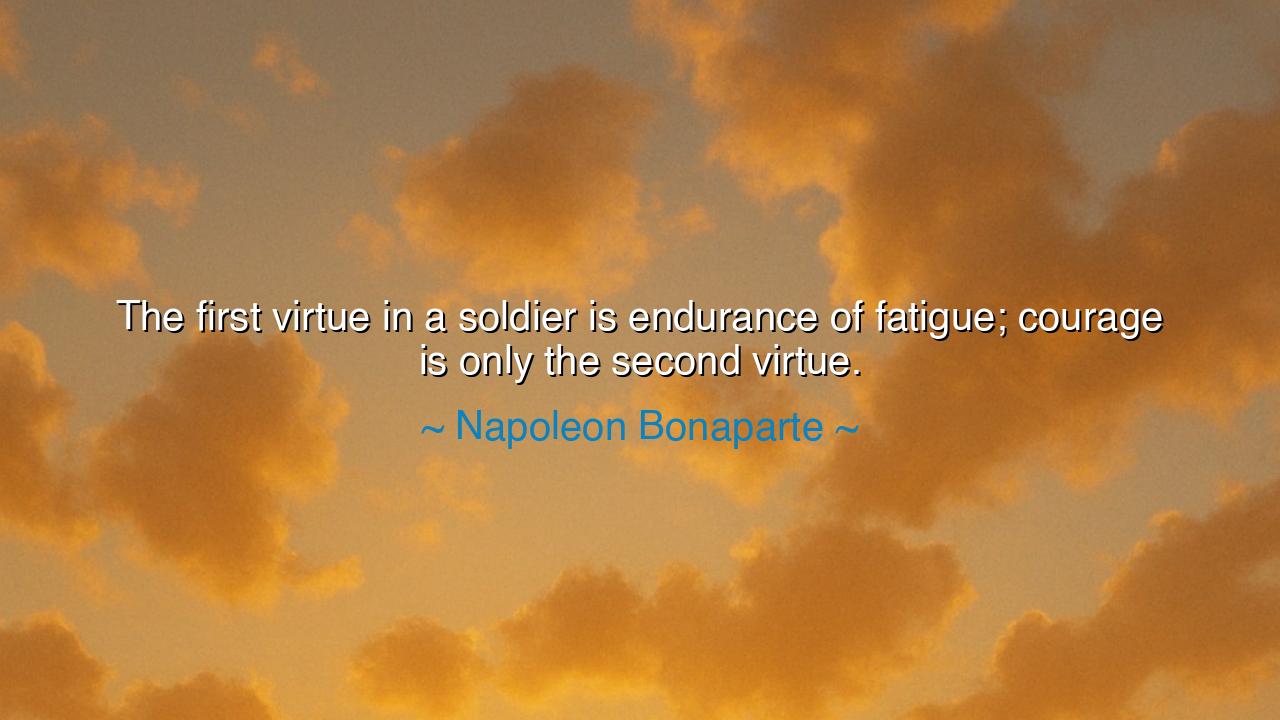
The first virtue in a soldier is endurance of fatigue; courage is
The first virtue in a soldier is endurance of fatigue; courage is only the second virtue.






The great general and emperor Napoleon Bonaparte, whose name echoes through the annals of history like the thunder of distant battle, once said: “The first virtue in a soldier is endurance of fatigue; courage is only the second virtue.” These words, born from the fires of endless campaigns, reveal a truth deeper than the roar of cannons or the glitter of victory. For endurance, not sudden courage, is the true foundation of greatness—not only in war, but in all the battles of life. Napoleon understood that the strength which prevails is not the flash of daring that blazes and dies, but the steady flame that burns through darkness, hunger, exhaustion, and despair.
To comprehend the depth of this wisdom, one must remember the world Napoleon commanded. His armies marched across continents, through frost and famine, through sleepless nights and blood-soaked days. He had seen men of fierce courage falter after their first charge, their spirits consumed by fatigue and fear. Yet he had also seen quiet men—unknown, uncelebrated—press on when their bodies cried for rest and their souls for mercy. These were the ones who carried victory on their shoulders, who built empires through endurance rather than glory. Thus, from his life among soldiers and storms, Napoleon learned that heroism begins not in the heart’s fire, but in the will’s persistence.
Endurance of fatigue—what is it, but the mastery of the self? It is the discipline to keep moving when the mind demands rest, to hold faith when the body trembles, to obey duty when every instinct calls for surrender. Courage is the spark that drives a man forward in the face of danger; endurance is the force that keeps him walking when the danger has not yet passed. The first is glorious, but the second is divine. For to endure is to bear the weight of time, to confront not only the enemy without, but the weakness within. It is the virtue of those who build, who persevere, who do not falter even when unseen.
History offers countless examples of this sacred truth. Consider the soldiers of Napoleon’s own Grand Armée during the terrible retreat from Moscow in 1812. The winter devoured them—their uniforms in tatters, their feet bleeding upon the frozen road, their rations gone, their comrades dying one by one. The glory of battle had long faded; no trumpets sounded, no flags waved. Yet they marched on, step by step, through cold and grief, through nights without warmth or food. Those who survived were not merely brave—they were enduring, and that endurance was the purest form of courage. It was courage stripped of glory, leaving only the raw strength of the human will.
This truth extends far beyond the battlefield. In every life, there are moments when courage alone is not enough—when the storm does not pass quickly, when pain does not yield to defiance. Then, what is required is endurance—the patience to persist, the faith to keep moving forward through monotony, through hardship, through exhaustion. The artist endures the long night of obscurity before the dawn of recognition. The parent endures years of sacrifice for the love of their child. The seeker of wisdom endures silence, doubt, and solitude before the light of understanding shines. All greatness—whether in art, love, or life—rests upon this same virtue.
In this way, Napoleon’s saying becomes not only a soldier’s creed but a universal law of perseverance. Endurance is the mother of achievement, the silent companion of every noble effort. To endure fatigue is to conquer the boundaries of one’s own strength. For the world often mistakes excitement for bravery, but true courage is quiet; it endures when there is no applause, no reward—only duty, only faith, only forward motion.
So, my children, take this wisdom to heart: “The first virtue in a soldier is endurance of fatigue; courage is only the second.” When the path grows long and weariness weighs upon you, remember that every step you take in perseverance is a victory. Do not wait for the surge of inspiration to move you—build instead the discipline that carries you when inspiration fades. Let your endurance be your armor and your consistency your sword. For the one who endures does not merely survive; he triumphs over time itself.
Thus, live as the soldiers of life’s eternal campaign—resolute, unwavering, steadfast in soul. When others falter, stand. When others rest, press on. And when at last you reach the summit of your trial, you will understand what Napoleon knew: that endurance is not lesser than courage, but its highest form—the quiet heroism that outlasts the noise of battle and the passage of kings.






AAdministratorAdministrator
Welcome, honored guests. Please leave a comment, we will respond soon